13?????????????
13?????????????
13. What is the best writing advice?
I think there are two extremely important pieces of advice for writing: one I learned from my creative writing professor at college, and the other I learned from Stephen King in his novel On Writing.
> From my creative writing professor: Keep a journal and don’t think about what you’re putting in it. Just create. Doodle, scribble, quote, write things down people sitting beside you say, etc. Do this for a few weeks and then look through it again. I guarantee you’ll find something interesting in there for inspiration. Or it will just encourage writing/creating every day.
> From Stephen King: You’ll never been a good writer if you don’t read. Read a lot. Read novels, short stories, whatever; but make sure you’re reading while you’re writing or you’re going to fail.
Both of these are very obviously paraphrased! But that’s the gist of them. I think they’re super, super important.
send me writer asks!
More Posts from Royalrhythm and Others
Are there other words like egregious where their meanings are antonyms?
you bet your butt there is! they’re called contronyms
(before getting into the words, I should clarify that the following words words aren’t really contronyms. Instead, their new definition is the opposite of the more archaic one)
artificial new definition: made or produced by human beings rather than occurring naturally.artificial old definition: artfully or skillfully made.awful new definition: very bad or unpleasant.awful old definition: inspiring reverential wonder.harlot new definition: a mischievous man.harlot old definition: a prostitute or promiscuous woman.resentment new definition: bitter indignation at having been treated unfairly.resentment old definition: the quality of being thankful.specious new definition: misleading in appearance, especially misleadingly attractive.specious old definition: fair or beautiful.symposium new definition: a drinking party.symposium old definition: a conference or meeting to discuss a particular subject.terrific new definition: of great size, amount, or intensity.terrific old definition: making someone afraid or anxious; terrifying.
then there are words that can mean one of two things which are opposite! (the true contronyms)
bitch: someone who is over aggressive or domineering OR someone who is excessively submissiveclip: to bind together OR to seperatedust: remove the dust from something OR apply dust to somethingoff: to turn off (a light) OR the go off (an alarm)resign: can either be resign or re-signseed: lay down seed OR remove the seeds from somethingstone: throw stones at OR remove the stone from a fruit (peaches, plums etc.)
thank you for the ask
Some words to use when writing things:
winking
clenching
pulsing
fluttering
contracting
twitching
sucking
quivering
pulsating
throbbing
beating
thumping
thudding
pounding
humming
palpitate
vibrate
grinding
crushing
hammering
lashing
knocking
driving
thrusting
pushing
force
injecting
filling
dilate
stretching
lingering
expanding
bouncing
reaming
elongate
enlarge
unfolding
yielding
sternly
firmly
tightly
harshly
thoroughly
consistently
precision
accuracy
carefully
demanding
strictly
restriction
meticulously
scrupulously
rigorously
rim
edge
lip
circle
band
encircling
enclosing
surrounding
piercing
curl
lock
twist
coil
spiral
whorl
dip
wet
soak
madly
wildly
noisily
rowdily
rambunctiously
decadent
degenerate
immoral
indulgent
accept
take
invite
nook
indentation
niche
depression
indent
depress
delay
tossing
writhing
flailing
squirming
rolling
wriggling
wiggling
thrashing
struggling
grappling
striving
straining
words to describe personality
positive adjectives:
amiable: having or displaying a friendly and pleasant manner.
diligent: having or showing care and conscientiousness in one’s work or duties.
exuberant: filled with or characterized by a lively energy and excitement.
gregarious: temperamentally seeking and enjoying the company of others.
convivial: friendly, lively, and enjoyable.
placid: not easily upset or excited.
adroit: clever or skillful in using the hands or mind.
amatory: relating to or induced by sexual love or desire.
negative adjectives:
boorish: rough and bad-mannered; coarse.
cantankerous: bad-tempered, argumentative, and uncooperative.
miserly: characterized by or indicative of lack of generosity.
pompous: affectedly and irritatingly grand, solemn, or self-important.
shiftless: characterized by laziness, indolence, and a lack of ambition.
parsimonious: unwilling to spend money or use resources; stingy or frugal.
obtuse: blunt; stupid
writers:
break up your paragraphs. big paragraphs are scary, your readers will get scared
fuuuuck epithets. “the other man got up” “the taller woman sat down” “the blonde walked away” nahhh. call them by their names or rework the sentence. you can do so much better than this (exception: if the reader doesn’t know the character(s) you’re referring to yet, it’s a-okay to refer to them by an identifying trait)
blunette is not a thing
new speaker, new paragraph. please.
“said” is such a great word. use it. make sweet love to it. but don’t kill it
use “said” more than you use synonyms for it. that way the use of synonyms gets more exciting. getting a sudden description of how a character is saying something (screaming, mumbling, sighing) is more interesting that way.
if your summary says “I suck at summaries” or “story better than summary” you’re turning off the reader, my dude. your summary is supposed to be your hook. you gotta own it, just like you’re gonna own the story they’re about to read
follow long sentences w short ones and short ones w long ones. same goes for paragraphs
your writing is always better than you think it is. you just think it’s bad because the story’s always gonna be predicable to the one who’s writing it
i love u guys keep on trucking
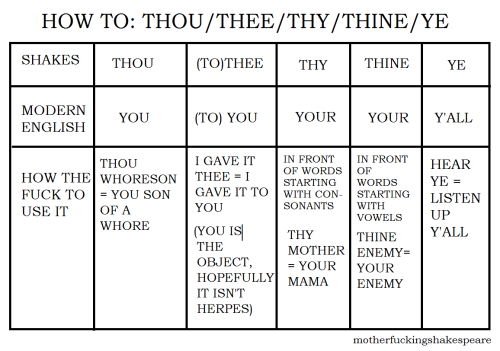
A HANDY CHART FOR THOSE OF YOU WONDERING WHAT THE FUCK IS UP WITH THESE. NOTE THAT THESE ARE ALL THE INFORMAL AND YOU IS THE FORMAL SO LIKE YOU WOULD ALWAYS ADDRESS YOUR SUPERIOR/ OLDER PERSON/ SOCIAL BETTER WITH YOU BUT WITH YOUR BUDS YOU CAN USE THESE.
oh and also!!!!
draw what makes you happy. don’t draw for notes or attention. sure, it sucks when people don’t give it as much attention as you want, but don’t do it for that.
don’t draw to get noticed. draw for passion. draw because you want to, not because you feel like you have to.
you’ll have a much better time if you draw for yourself, rather than others.
i am guilty of this sometimes, but i try my hardest not to fall into that cycle.

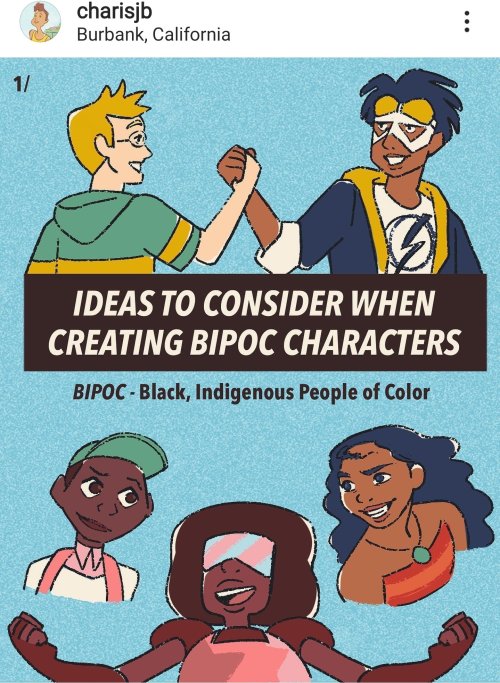
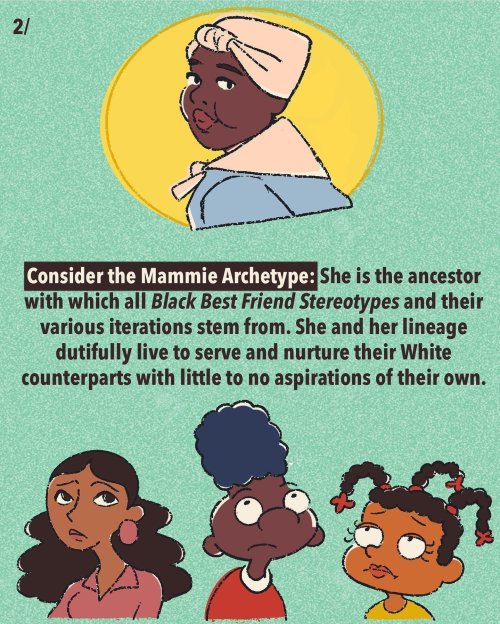
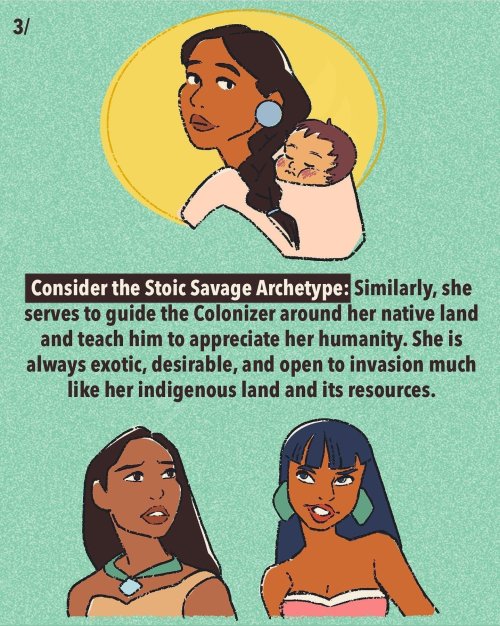
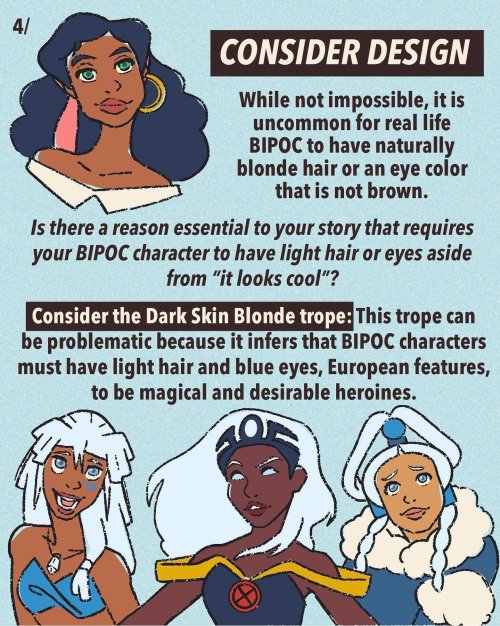
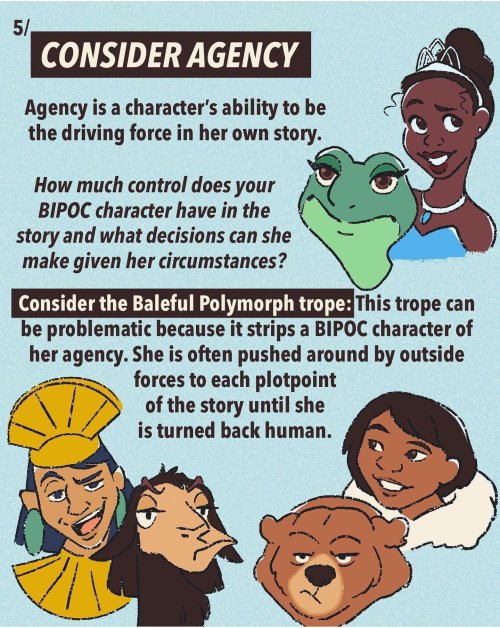

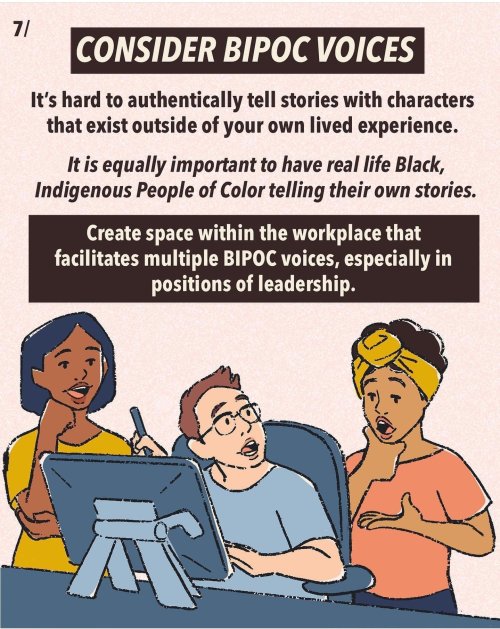
Important ideas to consider when creating characters who are black and indigenous people of color. (x)
Okay I'm not sure if you've posted something like this before but how do I go about designing a character that I have the foundation of in my head but nothing else? Where do I start? How do I keep momentum going?
Hmm. I think I have the perfect set of resources for you:
Giving Characters Bad Traits
Having Trouble Connecting To Your Characters?
Writing People Of Color
Writing Children
Useful Writing Resources
Useful Writing Resources II
Resources For Describing Characters
Resources For Creating Characters
Ways To Fit Character Development Into your Story
Writing Good Villains
Interview As Your Character
31 Days Of Character Development: Wordsnstuff May Writing Challenge
Let me know if it helps, and if there’s still some things you need some extra input on!
–
If you enjoy my blog and wish for it to continue being updated frequently and for me to continue putting my energy toward answering your questions, please consider Buying Me A Coffee or supporting me on Patreon.
Wordsnstuff also has a newsletter, which you can subscribe to by filling out the pop up on wordsnstuffblog.com.
I’d also really appreciate it if you would check out my separate blog dedicated to my current work in progress. I also run writing sprints over on snapchat.
Description: Kissing and Smiling
Anonymous asked: I’m having a problem when it comes to describing kisses and smiles without using the word lips and still sound natural. Usually, I don’t mind the word, but it seems like I’ve been using it far too often in my writing, especially when it comes to smiles or smirks. Do you have anything to help with that?
Writing smiles and kisses without using the word “lips” is pretty tricky, but it can be done. Just don’t go overboard in trying to avoid using the word. Lips are crucial to both of those actions, so you can’t avoid them entirely. One thing to keep in mind with describing kisses is that lips touching lips or skin isn’t the only thing going on. Hands are roaming, hearts are speed-thumping, and hormones are going crazy—so just spending a little time on what else is going on will both flesh out and lengthen the scene without having to keep describing what the lips are doing. Smiling, at least, gives us a little more to work with. For one thing, there are multiple ways to indicate that someone is smiling:
grinning
beaming
laughing
giggling
chuckling
simpering
sneering
There are also many ways to describe the face of someone who is smiling:
face brightened
face glowing
eyes lit up/sparkled/twinkled
looking delighted/happy/amused/pleased/satisfied
cheeks dimpled
upturned face
And there are ways to describe what the mouth is doing when someone smiles:
mouth upturned
mouth twitched (quick smile)
mouth quirked/quirked up/quirked at the corners
mouth twists with [emotion]
And, instead of smiling, you could describe other visible aspects of the emotion causing them to smile:
doing things with enthusiasm
a bounce in their step, skipping, dancing
swinging arms, tapping feet
showing interest
happy tears
fist-pump, clapping, moving excited
Also, internal aspects that the person smiling might be feeling:
radiating joy
lighthearted
feeling good
being content
(with thanks to The Emotion Thesaurus for help here…) Here are some additional resources for you: Kissing Scenes How to Write a Kissing Scene via letsvvrite Pucker Up! via WriteWorld 5 Steps to Writing the Perfect Kissing Scene via Miss Literati Describing Character Reactions And Emotions: She Smiled, He Frowned
How to Write a Character Falling Out of Love
How to write a character falling in love is a topic that’s been explored a lot on writing blogs, so when I was recently asked how to write a character falling out of love I felt like it needed a full post. Thanks to natashawattswrites for the question!
A lot of us know what it feels like to be infatuated with someone and then look back on the event later in life and say to ourselves, “why did I ever like that person?” It can sometimes be easy to feel that way looking back on something, but when you’re in the moment it’s harder to explain. How to do you explain the process of falling out of love with someone? How can you let your readers know what your character is feeling? Hopefully these tips will help you.
Here are a few ways to write a character falling out of love:
They will become less interested in the other person
One big way to show that your character is falling out of love is that they start to lose interest in what the other person likes or does. Maybe they find that they like to be alone more often. Where they were once excited to hang out with other person, now they never have the urge to.
They might feel annoyed
Focus on your character’s emotions toward the other person. They might snap at their partner easily. They might get annoyed by things they say. These will all help reveal that they might not feel the same anymore.
There was an event that changed their feelings
A great way to have a character fall out of love is to write in a scene that would explain their changing feelings. Maybe they were cheated on. Maybe they’re suspicious. Maybe they just don’t feel like they connect on the same level.
They might hate the thought of being alone with the other person
One major clue that your feelings have changed for another person is if you hate the thought of having to hang out with them. This might seem like a no-brainer, but we often make excuses for these emotions like “I have a headache” or “I’m just grumpy today”—instead of figuring out why it’s happening so often
They find interest in another person
Another good way to show that your character wants to move on is if they start to become interested in someone else. This might reflect what they’re missing in their current relationship or partnership.
They feel guilty
Sometimes when people fall out of love, they feel extremely guilty about their changing feelings. They might feel like they need to give it another shot or something is wrong with how they’re feeling. Have your character analyze these feelings and try to come to terms with their relationship.
They might be afraid to lose comfort
Many people stay in a relationship that’s not quite working out because they’re afraid of being alone and losing the comfort they have in their current situation. Obviously this isn’t true for all relationships, especially abusive situations, but it can be a major factor for your character. Maybe they’re afraid to move on or they feel like they’re making a mistake.
They might feel relief when it’s all over
A character falling out of love won’t be a completely negative experience. Sometimes ridding ourselves of relationships that aren’t working is a huge relief. Consider these feelings when writing your character. They might be happy to move on and admit that they’re no longer in love (or maybe they weren’t ever in love).
-Kris Noel
-
 royalrhythm reblogged this · 5 years ago
royalrhythm reblogged this · 5 years ago -
 royalrhythm liked this · 5 years ago
royalrhythm liked this · 5 years ago -
 diindjariin reblogged this · 5 years ago
diindjariin reblogged this · 5 years ago